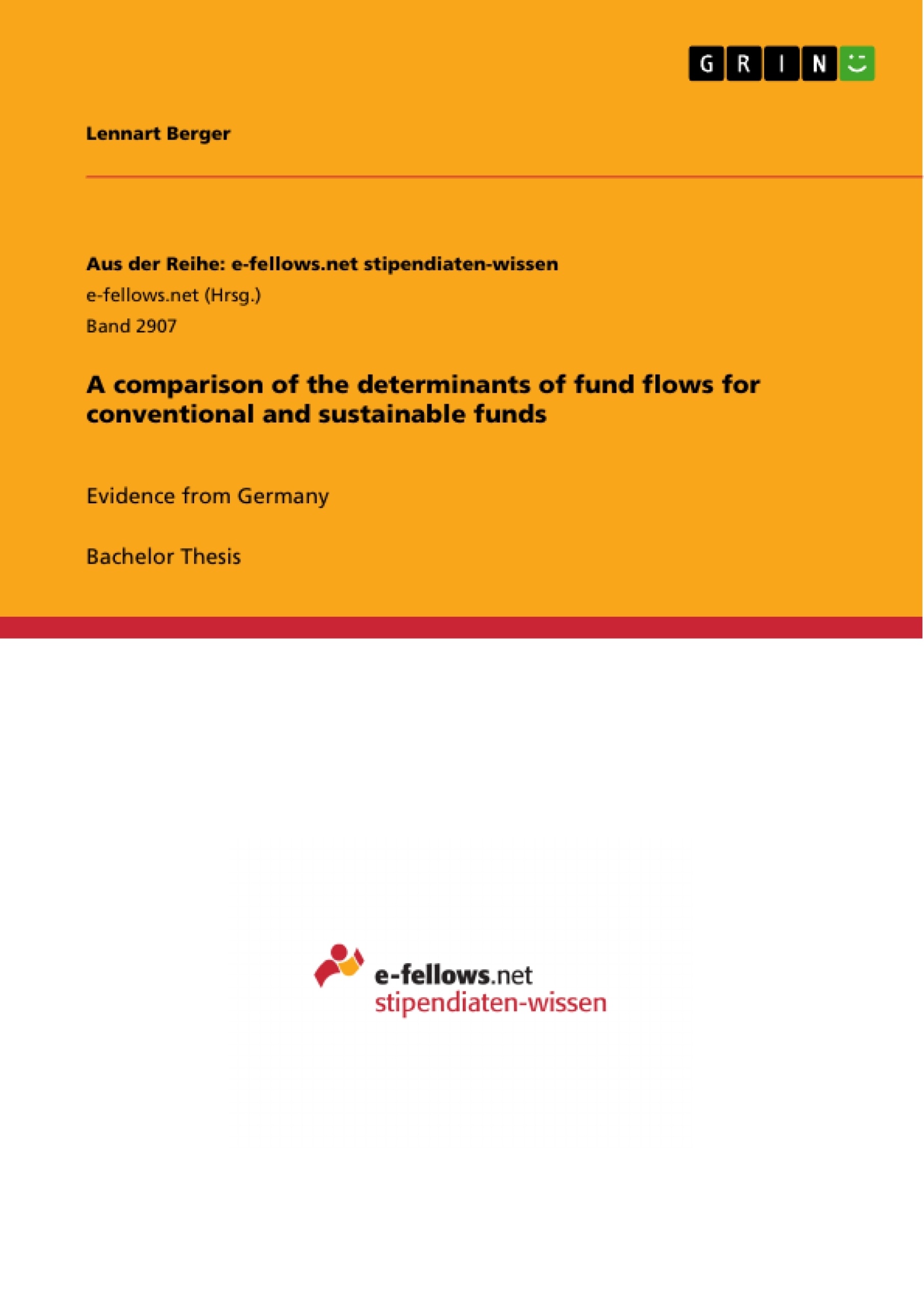This bachelor thesis investigates different determinants for absolute and relative fund flows in socially responsible investment (SRI) funds and conventional funds on the German Market. My multivariate analyses study the flow performance relationship, but also incorporate persistence in flows, expenses and typical fund characteristics such as age, total net assets and number of share classes. I find a high dependency of flows on prior returns from funds known as a return chasing behaviour. My model shows different flow-performance relations depending on the kind of sustainability fund and how the perception of investors changed over time towards being more sensitive regarding SRI criteria. Most importantly there exists a strong momentum effect for funds shown with persistent flows in Germany over different periods of time.
Inhaltsverzeichnis (Table of Contents)
- Introduction objectives and current relevance
- Literature review – Determinants of fund flows
- Creation of value through SRI screening
- Relation of returns on fund flows
- Loads and Expenses
- Literature review - Sustainable Investment Funds in Germany
- The SRI Market in Germany
- Regulation of SRI Investment Funds in Germany
- Performance of SRI Funds in Germany
- Empirical Analysis – Determinants of net fund flows between conventional and sustainable Investment Funds in Germany
- Data description and sample selection
- Categorization of Sustainable and Conventional Funds
- Methodology
- Results
- Observations and developments for underlying dataset
- Determinants of fund flows
Zielsetzung und Themenschwerpunkte (Objectives and Key Themes)
This bachelor's thesis aims to analyze the determinants of fund flows for both conventional and sustainable investment funds in Germany. By comparing these two categories, the research seeks to identify key factors that influence investor preferences and drive capital allocation in the German fund market.
- Determinants of fund flows in conventional and sustainable investment funds
- Impact of sustainability screening and ESG considerations on fund flows
- Role of performance, fees, and other factors in investor decision-making
- Comparison of fund flow dynamics between conventional and sustainable funds
- Analysis of the German sustainable investment market
Zusammenfassung der Kapitel (Chapter Summaries)
The thesis commences with an introduction outlining the research objectives and the current relevance of the topic within the German investment landscape. Chapter 2 delves into the existing literature on fund flow determinants, exploring the creation of value through SRI screening, the relationship between returns and fund flows, and the influence of loads and expenses. Chapter 3 focuses specifically on the German market for sustainable investment funds, discussing the market size, regulatory framework, and performance trends of SRI funds in Germany. Chapter 4 outlines the empirical methodology employed in the study, including data description, sample selection, and the categorization of sustainable and conventional funds. The results of the empirical analysis are presented in Chapter 5, focusing on the observed trends in the underlying dataset and identifying key determinants of fund flows. Finally, the conclusion summarizes the main findings and provides a discussion of the implications for investors and the investment industry.
Schlüsselwörter (Keywords)
The primary focus of this work lies on the determinants of fund flows in the German investment landscape. The analysis centers on identifying factors driving investor preferences for both conventional and sustainable funds. Key concepts include sustainable investment funds, ESG (Environmental, Social, and Governance) factors, fund performance, fees, and regulatory framework. The research investigates the impact of sustainability criteria on fund flows and compares the performance of conventional and sustainable funds within the German context.
- Citation du texte
- Lennart Berger (Auteur), 2017, A comparison of the determinants of fund flows for conventional and sustainable funds, Munich, GRIN Verlag, https://www.grin.com/document/448492




